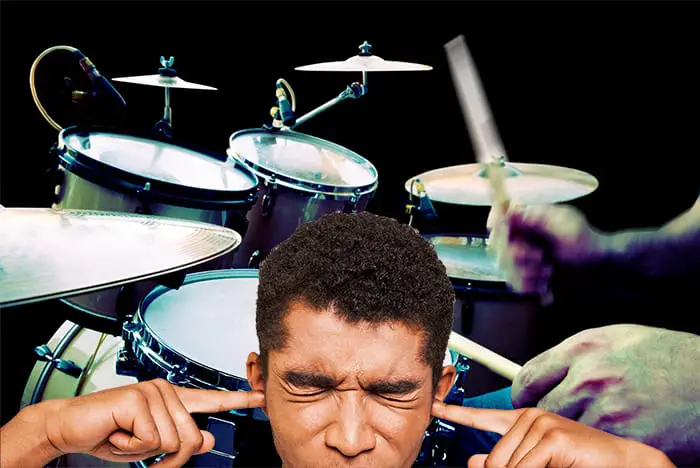
I have answered this particular question quite a bit in my teaching career as many parents of drum students have come to me with this exact question. Surprisingly, the answer isn’t quite as clear cut as you might think.
A drummer playing at almost any volume can cause hearing loss, especially if you are exposed to the sound for any significant amount of time at relatively close proximity without wearing any hearing protection. The louder the drums and the closer you are to the sound source, the more the danger increases of temporary or permanent damage to your ears.
Having said that, it’s really not just about volume but also the frequency of sounds you are experiencing as the human ear isn’t equally receptive to all frequency ranges. See, I told it wasn’t a straightforward answer! Let’s dig into the details, shall we?
The Basics of Hearing Loss At Various Volumes and Frequencies
Put very simply, while there are a few disease related causes for hearing loss, it is generally due to prolonged exposure to loud sounds. This is precisely why you find that workers in various industrial settings (who are not compliant with OSHA regulations) suffer from hearing loss.
It’s a shame really because this type of loss is so easily preventable by just wearing hearing protection, but that is a point of debate for another post.
I wrote a pretty lengthy article about tinnitus (that sensation of ringing in your ears) specifically for drummers, in which I go into detail about what causes this phenomenon. It is important not to confuse tinnitus with hearing loss though, as the ringing sound is a pretty good warning sign that any additional exposure to loud sounds could lead to hearing loss.
(that sensation of ringing in your ears) specifically for drummers, in which I go into detail about what causes this phenomenon. It is important not to confuse tinnitus with hearing loss though, as the ringing sound is a pretty good warning sign that any additional exposure to loud sounds could lead to hearing loss.
Tinnitus occurs when little hair-like receptors, called cilia, in the inner ear are damaged. Without further damage, tinnitus typically takes from a few minutes up to a day or two to subside without any further noticeable effects.
You start getting into trouble however when, after having damaged your ears you continue to expose yourself to loud sounds without proper hearing protection. This prolonged and repeated exposure is where hearing damage can and does happen.
There are some specific implications with regard to volume, proximity and frequency which are important to understand as well:
Volume & Proximity:
It is not enough to simply say that loud volume is the culprit in a lot of hearing loss cases. Understanding how volume changes in relation to your distance from the sound source is important here.
So, what is that relationship? In mathematical terms, every doubling of distance between you and a sound source results in a 6 dB reduction in volume. This may not sound like much, but it is actually quite a significant drop in sound intensity due to the fact that the decibel (dB) is a logarithmic measurement of volume.
Anyway, what I’m getting at here is that your distance from a sound (both loud and quiet) can have a big impact to the volume and your ears. Here are a couple of examples to further illustrate my point:
Example 1: The Rock Show
Imagine that you’re at a relatively large outdoor rock concert, hanging out on the lawn in the back of the venue. One of your closest friends finds you and tells you that they have an extra seat next to them (another friend couldn’t make it), which is much closer to the stage and as a result, the massive rack of speakers being used to amplify the band.
All of a sudden, you went from an environment with music playing at a comfortable 75-80 dB to an ear shattering 120 dB, which is technically the volume at which ear pain starts to occur.
In this first example, you can clearly see how the volume increased pretty dramatically by moving closer to a sound source in the same venue.
IMPORTANT NOTE: Even at the further distance, it is still a good idea to wear ear plugs as the prolonged nature of loud sounds can do damage as well.
Now, let’s explore another, perhaps not so obvious example:
Example 2: The Quiet Kit
You’re hanging out at your rehearsal space when a band mate of yours jumps on your drum kit and starts to play. Hearing this, you decide that it’s a great opportunity to hear the sound of your own drums when you’re not sitting directly behind it.
You instruct your fellow musician to play softly so you can get your ears in close and inspect the individual drums and cymbals. Even though the kit is being played softly, you are making a rookie mistake by putting your ears right up to the kit as it’s being played (without hearing protection) and even though it may not seem like it…are causing some damage to your ears in the process.
In the above example, the rule of distance from a sound source is super important. Have you ever snapped your fingers right at your ear? Kinda hurts, doesn’t it. The same principle applies here. Even though the kit was being played softly, the fact that your ears were right up against the instruments meant that you were exposing them to similar volumes as those of the close-up rock show!
Long story short – proximity goes hand in hand with volume. If you want to protect yourself and you don’t have hearing protection handy (though you can always plug your ears with your fingers) – just back up from the sound source. You’ll be happy you did!
Frequency
From the research I have done into this topic, there seems to be no real indication that ear damage occurs more at certain frequency ranges than others. What IS important to note though is that our ears are more sensitive at certain frequencies than others.
While our total hearing ranges from approximately 100Hz to 20-40kHz, our ears are most sensitive to ranges in the 1-4kHz range.
Fun Fact: This happens to coincide with the frequencies associated with human speech, especially that of a woman’s voice. Research suggests that this is a survival trait humans have developed in order for humans to easily recognize their mother’s voice in a noisy environment.
We aren’t as sensitive to very low and very high frequency sounds. This means that while ear damage may be impacting the entire range of your hearing, it is quite likely that you perceive it to be in that mid-range of frequencies because your ears are most sensitive to sounds in that range.
How Long Is Too Long For Unprotected Exposure?
There are various opinions about the details on this topic out there, but the general consensus is that you’ll want to limit your exposure to loud sounds without hearing protection to a few minutes; probably not more than 10.
That said, there are extremely loud sounds which you should avoid at all costs. Anything over 120dB would fall into this category and include gunshots at close range, standing in front of a speaker stack at a Foo Fighters (RIP Taylor Hawkins) show or standing close to the modern day John Bonham!
It goes without saying that your ears are pretty amazing and the more research I do about hearing loss in musicians, the more interesting I find these organs to be.
For instance: The reason why you can expose yourself to a very short period of relatively loud noise is because your ear has a small level of built in protection from those sounds. Your ear has neurotransmitters which send chemical signals to the brain to relay sound information. When a loud sound occurs, your ears temporarily inhibit the transmission of this information, which in turn protects you from hearing damage. Cool, eh?
Long story short: My advice would be to just avoid exposure to loud sounds without hearing protection. Carry a set of foam earplugs around with you…and definitely plug your ears with your fingers when that ambulance drives by.
What Are Good Hearing Protection Options?
I wrote an article about hearing protection for kiddos , but a lot of that advice holds true for adults as well. In the article you’ll find a few recommendations for various products on the market. For the sake of this article though, I have a couple of quick recommendations I can make:
, but a lot of that advice holds true for adults as well. In the article you’ll find a few recommendations for various products on the market. For the sake of this article though, I have a couple of quick recommendations I can make:
Everyday Protection: Go to your local drug store or truck stop and pick up a cheap pair of foam ear plugs (or 10). They are super inexpensive and tend to be very effective if properly worn. I used to carry a pair or two around in a little pill box in my pocket for those situations when I’d need to pop behind a drum kit for any extended period of time.
Pro Drumming Protection: My favorite piece of hearing protection gear tailored to dummers is probably the Vic Firth Stereo Isolation Headphones . They are comfortable headphones with excellent noise reduction characteristics designed specifically for drummers.
. They are comfortable headphones with excellent noise reduction characteristics designed specifically for drummers.
Related Questions
How do you tell if your hearing is damaged? Muffled sounds, trouble hearing high frequency sounds, difficulty understanding conversations (especially speech over the phone or in noisy places), ringing ears or generally turning the volume up on your devices more than you usually do are all indicators of some level of hearing loss.
Can ears recover from loud noises? Unless you’ve done permanent damage to your ears with prolonged exposure to extreme volumes, short bursts of loud volume noise is generally something you can recover from easily. I wrote an article about tinnitus which you might find interesting.
which you might find interesting.
Disclaimer:
While my goal with this article is to be helpful, I am not a medical professional and therefore it does not constitute medical advice. You should consult your doctor about your particular situation.
